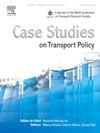The role of subscription sharing and nationality in MaaS uptake in Qatar
IF 2.4
Q3 TRANSPORTATION
引用次数: 0
Abstract
As urban environments grapple with complex transportation challenges, Mobility as a Service (MaaS) has emerged as a promising solution. MaaS integrates diverse transport modes into a seamless and user-centric platform, offering convenience, flexibility, and sustainability. However, its successful adoption hinges on understanding the factors shaping user preferences and subscriptions. This study comprehensively analyzes the intricate web of influences on MaaS adoption, including individual preferences, socio-demographic characteristics, and contextual factors like weather conditions, with a focus on the State of Qatar. The research investigates the impact of different transport modes, pricing factors, and subscription sharing on MaaS uptake while considering the role of gender, age, income, nationality, and occupation status. Data collected through a survey are utilized to develop econometric models for MaaS subscription usage. The study findings show that a comprehensive MaaS plan with diverse transportation options such as Metro, e-scooter/bike rides and ridesharing was preferred by individuals. Subscription sharing was favored but influenced by the extra cost, with higher prices deterring adoption. Furthermore, it is noteworthy that Arab immigrants exhibit a pronounced inclination towards subscribing in MaaS packages, suggesting a specific interest or receptiveness within this demographic. Additionally, the study reveals a higher likelihood of MaaS subscription adoption among households with lower incomes and certain occupational statuses. Finally, respondents expressed a significant willingness to pay up to QR 208 (USD 57) for each additional person allowed to share their monthly MaaS plan.
订阅共享和国籍在卡塔尔MaaS吸收中的作用
随着城市环境与复杂的交通挑战作斗争,移动即服务(MaaS)已成为一种有前途的解决方案。MaaS将多种运输方式集成到一个无缝的、以用户为中心的平台上,提供便利性、灵活性和可持续性。然而,它的成功采用取决于理解影响用户偏好和订阅的因素。本研究全面分析了影响MaaS采用的错综复杂的网络,包括个人偏好、社会人口特征和天气条件等背景因素,并以卡塔尔为重点。在考虑性别、年龄、收入、国籍和职业状况的影响下,该研究调查了不同的运输方式、定价因素和订阅共享对MaaS使用的影响。通过调查收集的数据用于开发MaaS订阅使用的计量经济模型。研究结果表明,个人更喜欢综合的MaaS计划,包括地铁、电动滑板车/自行车和拼车等多种交通选择。订阅共享受到青睐,但受到额外成本的影响,更高的价格阻碍了采用。此外,值得注意的是,阿拉伯移民明显倾向于订阅MaaS套餐,这表明这一人口中有特别的兴趣或接受能力。此外,该研究还显示,收入较低、职业状况较差的家庭更有可能采用MaaS服务。最后,受访者表示愿意为每增加一个允许分享他们每月MaaS计划的人支付高达208 QR(57美元)的费用。
本文章由计算机程序翻译,如有差异,请以英文原文为准。
求助全文
约1分钟内获得全文
求助全文

 求助内容:
求助内容: 应助结果提醒方式:
应助结果提醒方式:


